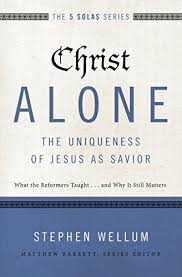
Historians and theologians alike have long recognized that at the heart of the sixteenth-century Protestant Reformation were five declarations (or “solas”) that distinguished the movement from other expressions of the Christian faith.
Five hundred years later, we live in a different time with fresh challenges to our faith. Yet these rallying cries of the Reformation continue to speak to us, addressing a wide range of contemporary issues. The Five Solas series will help you understand the historical and biblical context of the five solas and how to live out the relevance of Reformation theology today.
In Christ Alone, Stephen Wellum considers Christ’s singular uniqueness and significance biblically, historically, and today, in our pluralistic and postmodern age. He examines the historical roots of the doctrine, especially in the Reformation era, and then shows how the uniqueness of Christ has come under specific attack today. Then, he walks us through the storyline of Scripture, from Christ’s unique identity and work as prophet, priest, and king, to the application of his work to believers and our covenantal union with him to show that apart from Christ there is no salvation. Wellum shows that we must recover a robust biblical and theological doctrine of Christ’s person and work in the face of today’s challenges and explains why a fresh appraisal of the Reformation understanding of Christ alone is needed today.
Five hundred years later, we live in a different time with fresh challenges to our faith. Yet these rallying cries of the Reformation continue to speak to us, addressing a wide range of contemporary issues. The Five Solas series will help you understand the historical and biblical context of the five solas and how to live out the relevance of Reformation theology today.
In Christ Alone, Stephen Wellum considers Christ’s singular uniqueness and significance biblically, historically, and today, in our pluralistic and postmodern age. He examines the historical roots of the doctrine, especially in the Reformation era, and then shows how the uniqueness of Christ has come under specific attack today. Then, he walks us through the storyline of Scripture, from Christ’s unique identity and work as prophet, priest, and king, to the application of his work to believers and our covenantal union with him to show that apart from Christ there is no salvation. Wellum shows that we must recover a robust biblical and theological doctrine of Christ’s person and work in the face of today’s challenges and explains why a fresh appraisal of the Reformation understanding of Christ alone is needed today.



